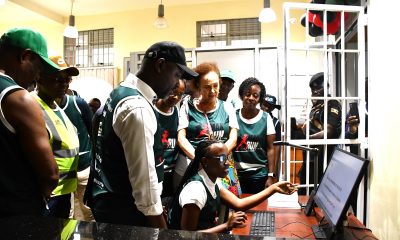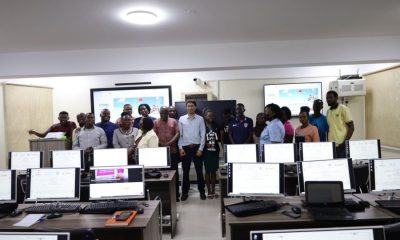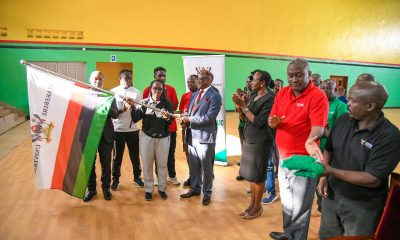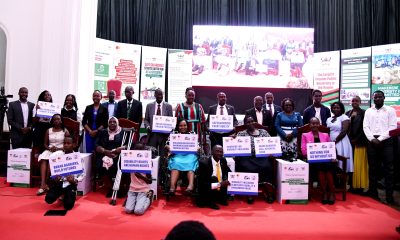When you visit Makerere University, it is hard to miss the various landmarks bearinghistorical names, names of great people and Pan-Africanists. The students’ Halls of residence that derive their names from Pan Africanists of our time include Nkrumah and Lumumba Halls. The most outstanding of these is probably Nkrumah Hall, named after the West African Osagyefo Dr. Kwame Nkrumah; who is remembered for leading Ghana to independence.
“As we celebrate the enduring legacy of Osagyefo Dr. Kwame Nkrumah, it is crucial to not only acknowledge the profound impact he had on the people of Ghana but also to understand how his vision continues to resonate with the youths of today,” affirms Dr. John Serbe Marfo, a lecturer at Kwame Nkrumah University of Science and Technology. Nkrumah’s life and work embody the very values that Nkrumah Hall at Makerere University proudly upholds – the ideals of Pan-Africanism, unity, and progress.
Nkrumah embarked on his journey as a statesman and visionary with a fervent call for the liberation of African nations from the clutches colonial rule. His unyielding commitment to the Pan-African cause earned him the revered title of “Osagyefo,” a name that has become synonymous with the hallowed Nkrumah Hall. This title signifies his unmatched dedication to the advancement of African people.
Upon visiting to the Hall, you are welcomed by Nkrumah’s sculpture with writings, “Activists, forward we ever move”. This motto encapsulates the spirit of Nkrumah’s leadership and remains profoundly relevant to the youth of today. It underscores the importance of continuous progress, of pushing the boundaries, and of collective efforts to advance the African continent. The 69-year-old hall accommodates over 450 male residents. Like the words of the Makerere University Anthem state, very many males who have gone through these gates have had the unique opportunity of being residents of this great Hall. According to the Dean of Students Mrs. Winifred Kabumbuli, some of the notable alumni include Dr. Ruhakana Rugunda, Mr. Onapito Ekolomoit the Board Chairperson, Nile Breweries Limited, Dr. Charles Kahigiriza, Headmaster Ndejje SS, among many others in Uganda and abroad.
According to Mrs. Kabumbuli, Nkrumah Hall was built in 1954 and was originally under the management of Northcote Hall (Now named Nsibirwa). She adds that Nkrumah Hall was named after Nkrumah the Pan-Africanist by way of appreciating his contribution to the liberation struggles in Africa against Colonialism.
“On a typical weekday, Nkrumah Hall’s corridors and common spaces are busy with students, going to and from lectures in pursuit of education like their highly educated hero-Nkrumah.They equally murmur with excitement about the forthcoming birthday of Kwame Nkrumah, their champion which is today, the 21st of September” remarked Mrs. Kabumbuli.
Mr. Duncan Nuwabigaba, the Hall Chairman says the idea of the annual Nkrumah day was birthed out of the need for students to connect with the Alumni who resided in Nkrumah Hall and share experiences, opportunities, challenges and also lay strategies for giving back to their Hall. He appeals to all the alumni to come and join this annual celebration to take stock of their achievements and learn more about Kwame Nkrumah, his values and contribution to the world.
This year’s celebrations shall happen on 30th September at Nkrumah Hall, and they shall include a football match between the alumni and the residents. There shall also be charity visits to homes of the elderly and orphanges. “I am glad to note that the students themselves guided by the Warden have chosen to help the people that did not have the rare opportunity of belonging to Nkrumah Hall and Makerere University”, said Mr. Nuwabigaba, before adding“Consequently, all the material and gifts to be donated have been generously given by the students, friends and well-wishers as we cultivate a culture of giving back to our Hall and communities that badly need our helping hand.”
According to the warden, Mr. Rodney Rugyema, it is important for the residents both past and present to celebrate what they are, understand Nkrumah in the true sense and emulate him. One of the most abused words today is activism. This has to be given true meaning from the Kwame Nkrumah perspective and the perspective of the university rules and regulations as well as the laws of the land so that students realise the goals for which they joined Makerere University. According to Mr. Rugyema, Nkrumah Hall has produced many great people in all spheres of life including doctors, professors, politicians, guild presidents including the current one,managers, head teachers, directors, etc.
“All these are a significant contribution to the development of Uganda like Dr. Kwame Nkrumah did in Ghana. I therefore call upon these great men in our land and beyond to come back home and inspire these students to ensure that they emulate them for better” said Mr. Rugyema.
In commemorating Osagyefo Dr. Kwame Nkrumah, Nkrumah Hall reaffirms its dedication to the principles that define its existence. It is a call to delve deeper into the life and accomplishments of this great African leader and to recognize that his legacy remains a beacon of hope and inspiration for all generations.
“Today’s youth can find guidance in Nkrumah’s unwavering commitment to progress through unity, determination, and an unrelenting focus on the betterment of our continent”, says Dr John Serbe Marfo.
Forwards Ever, Backwards Never


 General17 hours ago
General17 hours ago
 General17 hours ago
General17 hours ago
 Humanities & Social Sciences2 weeks ago
Humanities & Social Sciences2 weeks ago
 General1 week ago
General1 week ago
 Agriculture & Environment2 weeks ago
Agriculture & Environment2 weeks ago














